An Analysis of the Positive and Negative Aspects of Knowledge Pursuit
VerifiedAdded on 2023/04/26
|10
|3041
|427
Essay
AI Summary
This essay delves into the multifaceted nature of the desire for knowledge, beginning with the biblical story of Adam and Eve and their transgression in the Garden of Eden. It examines both the positive and negative consequences of seeking knowledge, arguing that while the pursuit of knowledge can lead to sin and potential negative outcomes, its benefits far outweigh the drawbacks. The essay highlights the importance of knowledge in a competitive world and the distinction between valuable and excessive knowledge. It explores the positive aspects of the desire for knowledge, such as broadening the mind, fostering innovation, and promoting a sense of accomplishment. It also discusses the negative aspects, including the potential for disbelief, stress, misuse, and the limitations of the human mind to contain all knowledge. The essay uses various scholarly sources to support its arguments, providing a balanced and comprehensive analysis of the subject.
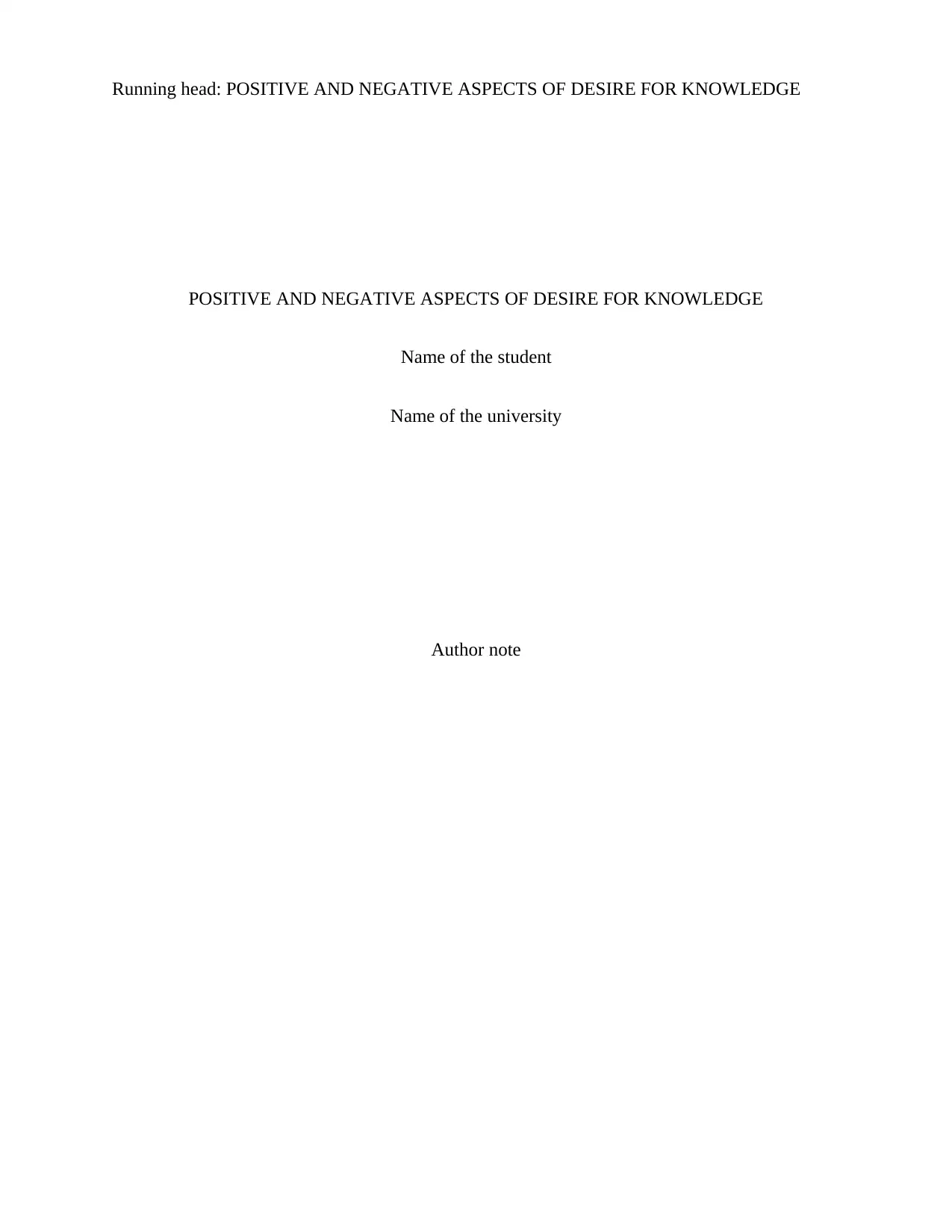
Running head: POSITIVE AND NEGATIVE ASPECTS OF DESIRE FOR KNOWLEDGE
POSITIVE AND NEGATIVE ASPECTS OF DESIRE FOR KNOWLEDGE
Name of the student
Name of the university
Author note
POSITIVE AND NEGATIVE ASPECTS OF DESIRE FOR KNOWLEDGE
Name of the student
Name of the university
Author note
Paraphrase This Document
Need a fresh take? Get an instant paraphrase of this document with our AI Paraphraser
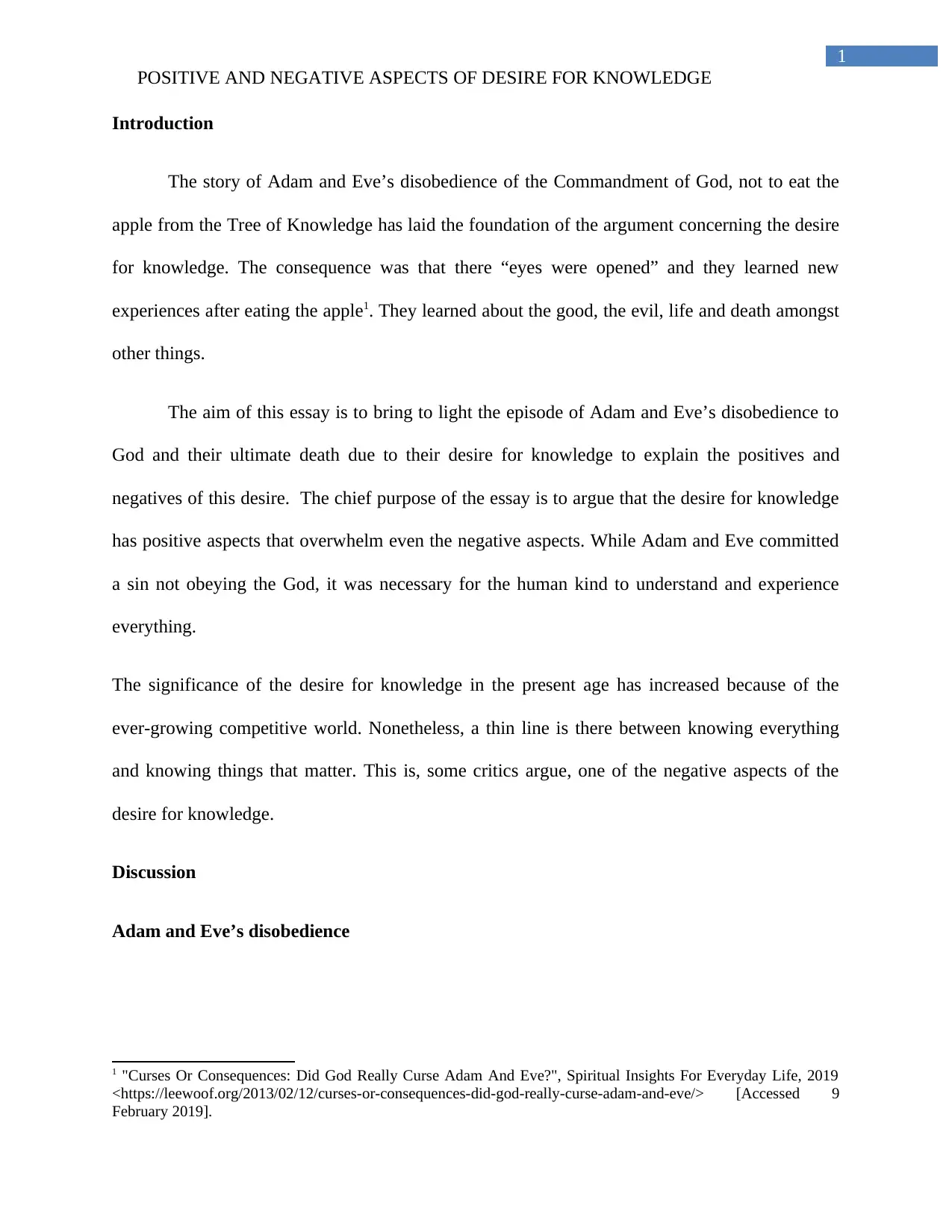
1
POSITIVE AND NEGATIVE ASPECTS OF DESIRE FOR KNOWLEDGE
Introduction
The story of Adam and Eve’s disobedience of the Commandment of God, not to eat the
apple from the Tree of Knowledge has laid the foundation of the argument concerning the desire
for knowledge. The consequence was that there “eyes were opened” and they learned new
experiences after eating the apple1. They learned about the good, the evil, life and death amongst
other things.
The aim of this essay is to bring to light the episode of Adam and Eve’s disobedience to
God and their ultimate death due to their desire for knowledge to explain the positives and
negatives of this desire. The chief purpose of the essay is to argue that the desire for knowledge
has positive aspects that overwhelm even the negative aspects. While Adam and Eve committed
a sin not obeying the God, it was necessary for the human kind to understand and experience
everything.
The significance of the desire for knowledge in the present age has increased because of the
ever-growing competitive world. Nonetheless, a thin line is there between knowing everything
and knowing things that matter. This is, some critics argue, one of the negative aspects of the
desire for knowledge.
Discussion
Adam and Eve’s disobedience
1 "Curses Or Consequences: Did God Really Curse Adam And Eve?", Spiritual Insights For Everyday Life, 2019
<https://leewoof.org/2013/02/12/curses-or-consequences-did-god-really-curse-adam-and-eve/> [Accessed 9
February 2019].
POSITIVE AND NEGATIVE ASPECTS OF DESIRE FOR KNOWLEDGE
Introduction
The story of Adam and Eve’s disobedience of the Commandment of God, not to eat the
apple from the Tree of Knowledge has laid the foundation of the argument concerning the desire
for knowledge. The consequence was that there “eyes were opened” and they learned new
experiences after eating the apple1. They learned about the good, the evil, life and death amongst
other things.
The aim of this essay is to bring to light the episode of Adam and Eve’s disobedience to
God and their ultimate death due to their desire for knowledge to explain the positives and
negatives of this desire. The chief purpose of the essay is to argue that the desire for knowledge
has positive aspects that overwhelm even the negative aspects. While Adam and Eve committed
a sin not obeying the God, it was necessary for the human kind to understand and experience
everything.
The significance of the desire for knowledge in the present age has increased because of the
ever-growing competitive world. Nonetheless, a thin line is there between knowing everything
and knowing things that matter. This is, some critics argue, one of the negative aspects of the
desire for knowledge.
Discussion
Adam and Eve’s disobedience
1 "Curses Or Consequences: Did God Really Curse Adam And Eve?", Spiritual Insights For Everyday Life, 2019
<https://leewoof.org/2013/02/12/curses-or-consequences-did-god-really-curse-adam-and-eve/> [Accessed 9
February 2019].
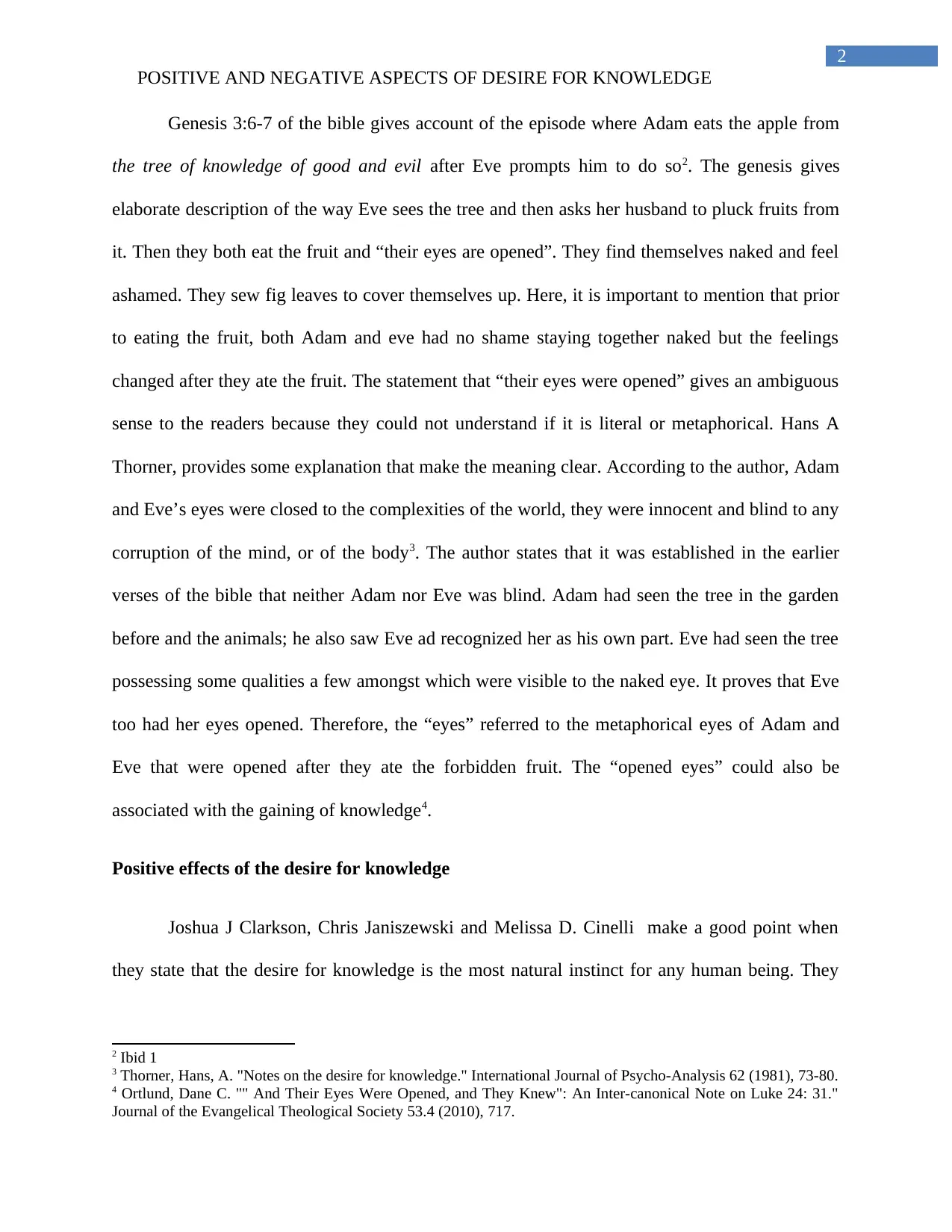
2
POSITIVE AND NEGATIVE ASPECTS OF DESIRE FOR KNOWLEDGE
Genesis 3:6-7 of the bible gives account of the episode where Adam eats the apple from
the tree of knowledge of good and evil after Eve prompts him to do so2. The genesis gives
elaborate description of the way Eve sees the tree and then asks her husband to pluck fruits from
it. Then they both eat the fruit and “their eyes are opened”. They find themselves naked and feel
ashamed. They sew fig leaves to cover themselves up. Here, it is important to mention that prior
to eating the fruit, both Adam and eve had no shame staying together naked but the feelings
changed after they ate the fruit. The statement that “their eyes were opened” gives an ambiguous
sense to the readers because they could not understand if it is literal or metaphorical. Hans A
Thorner, provides some explanation that make the meaning clear. According to the author, Adam
and Eve’s eyes were closed to the complexities of the world, they were innocent and blind to any
corruption of the mind, or of the body3. The author states that it was established in the earlier
verses of the bible that neither Adam nor Eve was blind. Adam had seen the tree in the garden
before and the animals; he also saw Eve ad recognized her as his own part. Eve had seen the tree
possessing some qualities a few amongst which were visible to the naked eye. It proves that Eve
too had her eyes opened. Therefore, the “eyes” referred to the metaphorical eyes of Adam and
Eve that were opened after they ate the forbidden fruit. The “opened eyes” could also be
associated with the gaining of knowledge4.
Positive effects of the desire for knowledge
Joshua J Clarkson, Chris Janiszewski and Melissa D. Cinelli make a good point when
they state that the desire for knowledge is the most natural instinct for any human being. They
2 Ibid 1
3 Thorner, Hans, A. "Notes on the desire for knowledge." International Journal of Psycho-Analysis 62 (1981), 73-80.
4 Ortlund, Dane C. "" And Their Eyes Were Opened, and They Knew": An Inter-canonical Note on Luke 24: 31."
Journal of the Evangelical Theological Society 53.4 (2010), 717.
POSITIVE AND NEGATIVE ASPECTS OF DESIRE FOR KNOWLEDGE
Genesis 3:6-7 of the bible gives account of the episode where Adam eats the apple from
the tree of knowledge of good and evil after Eve prompts him to do so2. The genesis gives
elaborate description of the way Eve sees the tree and then asks her husband to pluck fruits from
it. Then they both eat the fruit and “their eyes are opened”. They find themselves naked and feel
ashamed. They sew fig leaves to cover themselves up. Here, it is important to mention that prior
to eating the fruit, both Adam and eve had no shame staying together naked but the feelings
changed after they ate the fruit. The statement that “their eyes were opened” gives an ambiguous
sense to the readers because they could not understand if it is literal or metaphorical. Hans A
Thorner, provides some explanation that make the meaning clear. According to the author, Adam
and Eve’s eyes were closed to the complexities of the world, they were innocent and blind to any
corruption of the mind, or of the body3. The author states that it was established in the earlier
verses of the bible that neither Adam nor Eve was blind. Adam had seen the tree in the garden
before and the animals; he also saw Eve ad recognized her as his own part. Eve had seen the tree
possessing some qualities a few amongst which were visible to the naked eye. It proves that Eve
too had her eyes opened. Therefore, the “eyes” referred to the metaphorical eyes of Adam and
Eve that were opened after they ate the forbidden fruit. The “opened eyes” could also be
associated with the gaining of knowledge4.
Positive effects of the desire for knowledge
Joshua J Clarkson, Chris Janiszewski and Melissa D. Cinelli make a good point when
they state that the desire for knowledge is the most natural instinct for any human being. They
2 Ibid 1
3 Thorner, Hans, A. "Notes on the desire for knowledge." International Journal of Psycho-Analysis 62 (1981), 73-80.
4 Ortlund, Dane C. "" And Their Eyes Were Opened, and They Knew": An Inter-canonical Note on Luke 24: 31."
Journal of the Evangelical Theological Society 53.4 (2010), 717.
⊘ This is a preview!⊘
Do you want full access?
Subscribe today to unlock all pages.

Trusted by 1+ million students worldwide
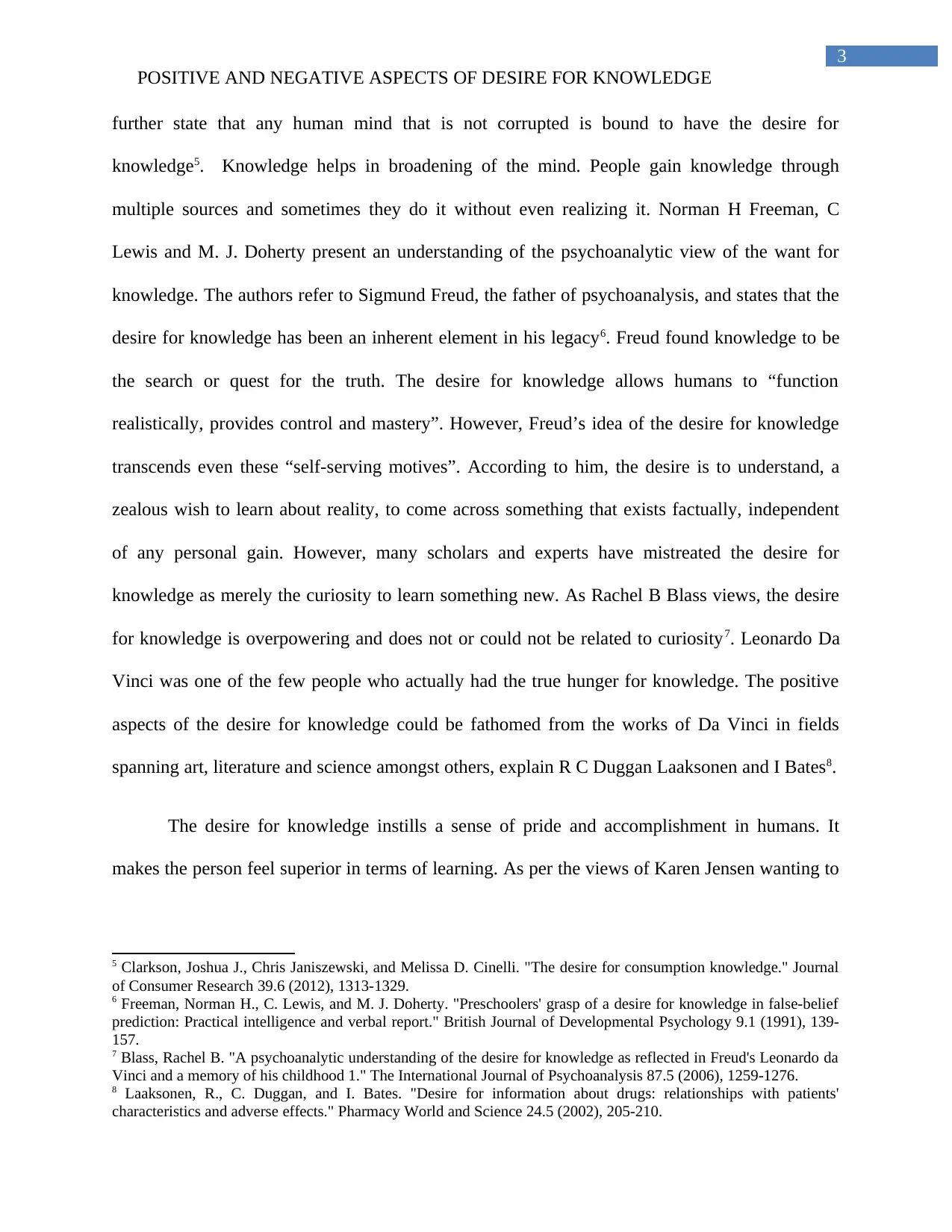
3
POSITIVE AND NEGATIVE ASPECTS OF DESIRE FOR KNOWLEDGE
further state that any human mind that is not corrupted is bound to have the desire for
knowledge5. Knowledge helps in broadening of the mind. People gain knowledge through
multiple sources and sometimes they do it without even realizing it. Norman H Freeman, C
Lewis and M. J. Doherty present an understanding of the psychoanalytic view of the want for
knowledge. The authors refer to Sigmund Freud, the father of psychoanalysis, and states that the
desire for knowledge has been an inherent element in his legacy6. Freud found knowledge to be
the search or quest for the truth. The desire for knowledge allows humans to “function
realistically, provides control and mastery”. However, Freud’s idea of the desire for knowledge
transcends even these “self-serving motives”. According to him, the desire is to understand, a
zealous wish to learn about reality, to come across something that exists factually, independent
of any personal gain. However, many scholars and experts have mistreated the desire for
knowledge as merely the curiosity to learn something new. As Rachel B Blass views, the desire
for knowledge is overpowering and does not or could not be related to curiosity7. Leonardo Da
Vinci was one of the few people who actually had the true hunger for knowledge. The positive
aspects of the desire for knowledge could be fathomed from the works of Da Vinci in fields
spanning art, literature and science amongst others, explain R C Duggan Laaksonen and I Bates8.
The desire for knowledge instills a sense of pride and accomplishment in humans. It
makes the person feel superior in terms of learning. As per the views of Karen Jensen wanting to
5 Clarkson, Joshua J., Chris Janiszewski, and Melissa D. Cinelli. "The desire for consumption knowledge." Journal
of Consumer Research 39.6 (2012), 1313-1329.
6 Freeman, Norman H., C. Lewis, and M. J. Doherty. "Preschoolers' grasp of a desire for knowledge in false‐belief
prediction: Practical intelligence and verbal report." British Journal of Developmental Psychology 9.1 (1991), 139-
157.
7 Blass, Rachel B. "A psychoanalytic understanding of the desire for knowledge as reflected in Freud's Leonardo da
Vinci and a memory of his childhood 1." The International Journal of Psychoanalysis 87.5 (2006), 1259-1276.
8 Laaksonen, R., C. Duggan, and I. Bates. "Desire for information about drugs: relationships with patients'
characteristics and adverse effects." Pharmacy World and Science 24.5 (2002), 205-210.
POSITIVE AND NEGATIVE ASPECTS OF DESIRE FOR KNOWLEDGE
further state that any human mind that is not corrupted is bound to have the desire for
knowledge5. Knowledge helps in broadening of the mind. People gain knowledge through
multiple sources and sometimes they do it without even realizing it. Norman H Freeman, C
Lewis and M. J. Doherty present an understanding of the psychoanalytic view of the want for
knowledge. The authors refer to Sigmund Freud, the father of psychoanalysis, and states that the
desire for knowledge has been an inherent element in his legacy6. Freud found knowledge to be
the search or quest for the truth. The desire for knowledge allows humans to “function
realistically, provides control and mastery”. However, Freud’s idea of the desire for knowledge
transcends even these “self-serving motives”. According to him, the desire is to understand, a
zealous wish to learn about reality, to come across something that exists factually, independent
of any personal gain. However, many scholars and experts have mistreated the desire for
knowledge as merely the curiosity to learn something new. As Rachel B Blass views, the desire
for knowledge is overpowering and does not or could not be related to curiosity7. Leonardo Da
Vinci was one of the few people who actually had the true hunger for knowledge. The positive
aspects of the desire for knowledge could be fathomed from the works of Da Vinci in fields
spanning art, literature and science amongst others, explain R C Duggan Laaksonen and I Bates8.
The desire for knowledge instills a sense of pride and accomplishment in humans. It
makes the person feel superior in terms of learning. As per the views of Karen Jensen wanting to
5 Clarkson, Joshua J., Chris Janiszewski, and Melissa D. Cinelli. "The desire for consumption knowledge." Journal
of Consumer Research 39.6 (2012), 1313-1329.
6 Freeman, Norman H., C. Lewis, and M. J. Doherty. "Preschoolers' grasp of a desire for knowledge in false‐belief
prediction: Practical intelligence and verbal report." British Journal of Developmental Psychology 9.1 (1991), 139-
157.
7 Blass, Rachel B. "A psychoanalytic understanding of the desire for knowledge as reflected in Freud's Leonardo da
Vinci and a memory of his childhood 1." The International Journal of Psychoanalysis 87.5 (2006), 1259-1276.
8 Laaksonen, R., C. Duggan, and I. Bates. "Desire for information about drugs: relationships with patients'
characteristics and adverse effects." Pharmacy World and Science 24.5 (2002), 205-210.
Paraphrase This Document
Need a fresh take? Get an instant paraphrase of this document with our AI Paraphraser
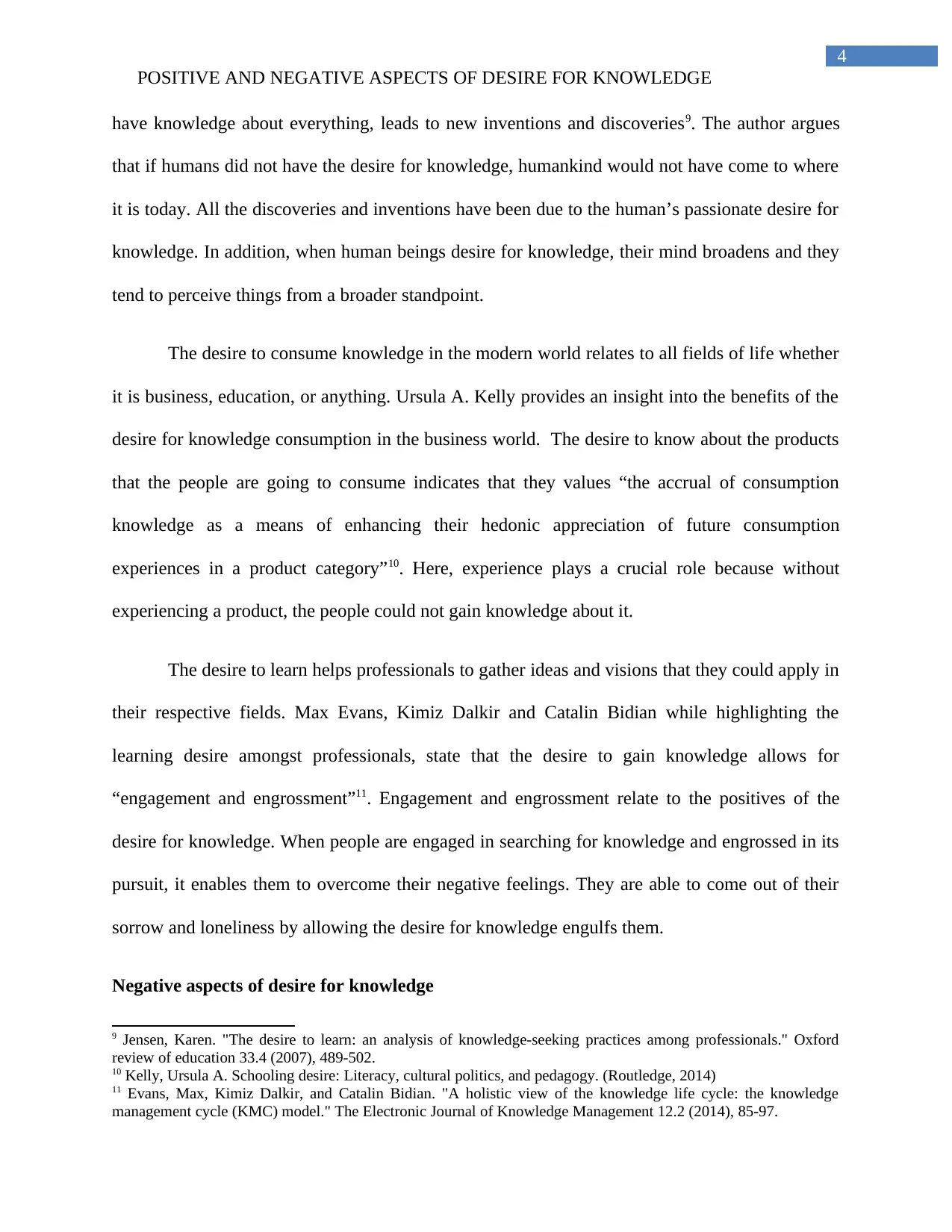
4
POSITIVE AND NEGATIVE ASPECTS OF DESIRE FOR KNOWLEDGE
have knowledge about everything, leads to new inventions and discoveries9. The author argues
that if humans did not have the desire for knowledge, humankind would not have come to where
it is today. All the discoveries and inventions have been due to the human’s passionate desire for
knowledge. In addition, when human beings desire for knowledge, their mind broadens and they
tend to perceive things from a broader standpoint.
The desire to consume knowledge in the modern world relates to all fields of life whether
it is business, education, or anything. Ursula A. Kelly provides an insight into the benefits of the
desire for knowledge consumption in the business world. The desire to know about the products
that the people are going to consume indicates that they values “the accrual of consumption
knowledge as a means of enhancing their hedonic appreciation of future consumption
experiences in a product category”10. Here, experience plays a crucial role because without
experiencing a product, the people could not gain knowledge about it.
The desire to learn helps professionals to gather ideas and visions that they could apply in
their respective fields. Max Evans, Kimiz Dalkir and Catalin Bidian while highlighting the
learning desire amongst professionals, state that the desire to gain knowledge allows for
“engagement and engrossment”11. Engagement and engrossment relate to the positives of the
desire for knowledge. When people are engaged in searching for knowledge and engrossed in its
pursuit, it enables them to overcome their negative feelings. They are able to come out of their
sorrow and loneliness by allowing the desire for knowledge engulfs them.
Negative aspects of desire for knowledge
9 Jensen, Karen. "The desire to learn: an analysis of knowledge‐seeking practices among professionals." Oxford
review of education 33.4 (2007), 489-502.
10 Kelly, Ursula A. Schooling desire: Literacy, cultural politics, and pedagogy. (Routledge, 2014)
11 Evans, Max, Kimiz Dalkir, and Catalin Bidian. "A holistic view of the knowledge life cycle: the knowledge
management cycle (KMC) model." The Electronic Journal of Knowledge Management 12.2 (2014), 85-97.
POSITIVE AND NEGATIVE ASPECTS OF DESIRE FOR KNOWLEDGE
have knowledge about everything, leads to new inventions and discoveries9. The author argues
that if humans did not have the desire for knowledge, humankind would not have come to where
it is today. All the discoveries and inventions have been due to the human’s passionate desire for
knowledge. In addition, when human beings desire for knowledge, their mind broadens and they
tend to perceive things from a broader standpoint.
The desire to consume knowledge in the modern world relates to all fields of life whether
it is business, education, or anything. Ursula A. Kelly provides an insight into the benefits of the
desire for knowledge consumption in the business world. The desire to know about the products
that the people are going to consume indicates that they values “the accrual of consumption
knowledge as a means of enhancing their hedonic appreciation of future consumption
experiences in a product category”10. Here, experience plays a crucial role because without
experiencing a product, the people could not gain knowledge about it.
The desire to learn helps professionals to gather ideas and visions that they could apply in
their respective fields. Max Evans, Kimiz Dalkir and Catalin Bidian while highlighting the
learning desire amongst professionals, state that the desire to gain knowledge allows for
“engagement and engrossment”11. Engagement and engrossment relate to the positives of the
desire for knowledge. When people are engaged in searching for knowledge and engrossed in its
pursuit, it enables them to overcome their negative feelings. They are able to come out of their
sorrow and loneliness by allowing the desire for knowledge engulfs them.
Negative aspects of desire for knowledge
9 Jensen, Karen. "The desire to learn: an analysis of knowledge‐seeking practices among professionals." Oxford
review of education 33.4 (2007), 489-502.
10 Kelly, Ursula A. Schooling desire: Literacy, cultural politics, and pedagogy. (Routledge, 2014)
11 Evans, Max, Kimiz Dalkir, and Catalin Bidian. "A holistic view of the knowledge life cycle: the knowledge
management cycle (KMC) model." The Electronic Journal of Knowledge Management 12.2 (2014), 85-97.
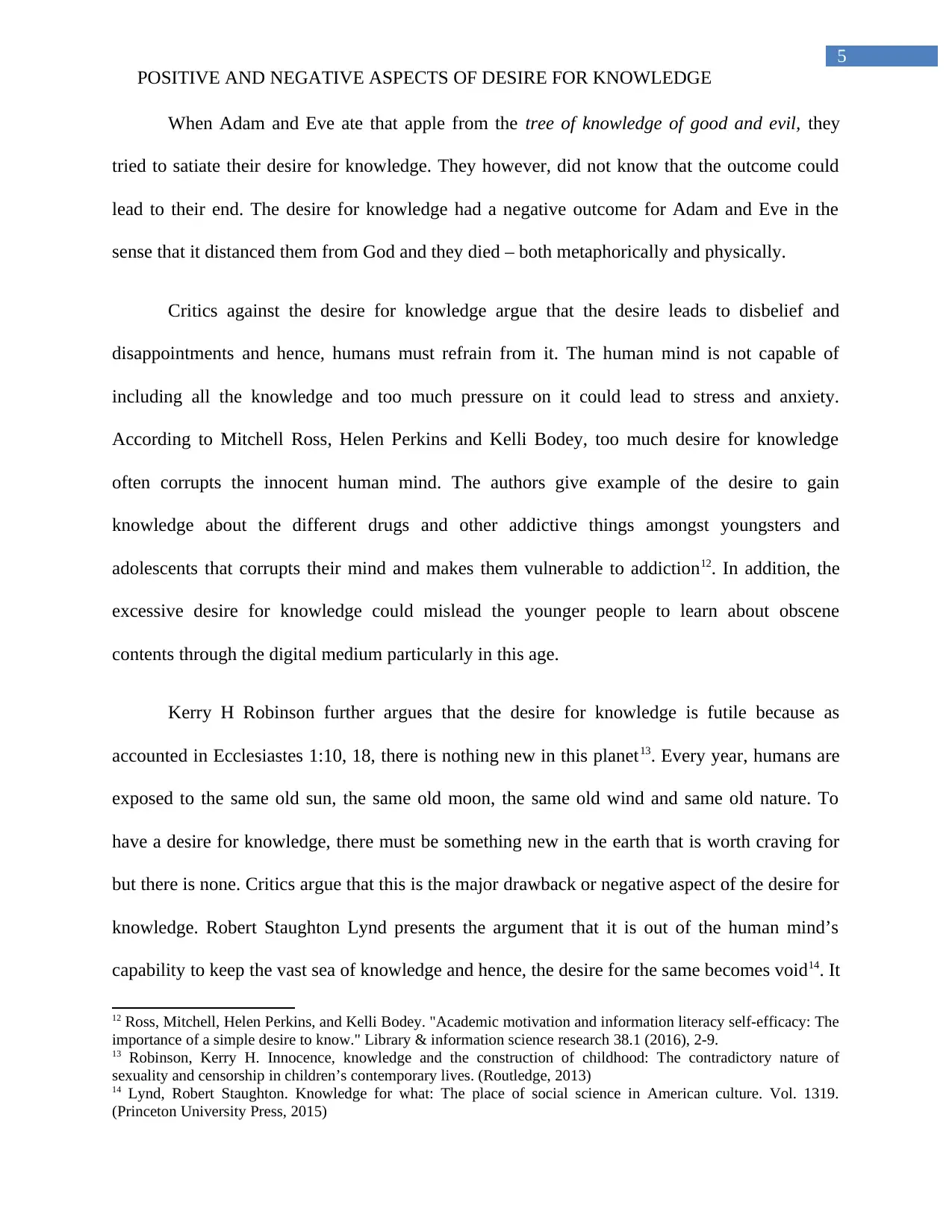
5
POSITIVE AND NEGATIVE ASPECTS OF DESIRE FOR KNOWLEDGE
When Adam and Eve ate that apple from the tree of knowledge of good and evil, they
tried to satiate their desire for knowledge. They however, did not know that the outcome could
lead to their end. The desire for knowledge had a negative outcome for Adam and Eve in the
sense that it distanced them from God and they died – both metaphorically and physically.
Critics against the desire for knowledge argue that the desire leads to disbelief and
disappointments and hence, humans must refrain from it. The human mind is not capable of
including all the knowledge and too much pressure on it could lead to stress and anxiety.
According to Mitchell Ross, Helen Perkins and Kelli Bodey, too much desire for knowledge
often corrupts the innocent human mind. The authors give example of the desire to gain
knowledge about the different drugs and other addictive things amongst youngsters and
adolescents that corrupts their mind and makes them vulnerable to addiction12. In addition, the
excessive desire for knowledge could mislead the younger people to learn about obscene
contents through the digital medium particularly in this age.
Kerry H Robinson further argues that the desire for knowledge is futile because as
accounted in Ecclesiastes 1:10, 18, there is nothing new in this planet13. Every year, humans are
exposed to the same old sun, the same old moon, the same old wind and same old nature. To
have a desire for knowledge, there must be something new in the earth that is worth craving for
but there is none. Critics argue that this is the major drawback or negative aspect of the desire for
knowledge. Robert Staughton Lynd presents the argument that it is out of the human mind’s
capability to keep the vast sea of knowledge and hence, the desire for the same becomes void14. It
12 Ross, Mitchell, Helen Perkins, and Kelli Bodey. "Academic motivation and information literacy self-efficacy: The
importance of a simple desire to know." Library & information science research 38.1 (2016), 2-9.
13 Robinson, Kerry H. Innocence, knowledge and the construction of childhood: The contradictory nature of
sexuality and censorship in children’s contemporary lives. (Routledge, 2013)
14 Lynd, Robert Staughton. Knowledge for what: The place of social science in American culture. Vol. 1319.
(Princeton University Press, 2015)
POSITIVE AND NEGATIVE ASPECTS OF DESIRE FOR KNOWLEDGE
When Adam and Eve ate that apple from the tree of knowledge of good and evil, they
tried to satiate their desire for knowledge. They however, did not know that the outcome could
lead to their end. The desire for knowledge had a negative outcome for Adam and Eve in the
sense that it distanced them from God and they died – both metaphorically and physically.
Critics against the desire for knowledge argue that the desire leads to disbelief and
disappointments and hence, humans must refrain from it. The human mind is not capable of
including all the knowledge and too much pressure on it could lead to stress and anxiety.
According to Mitchell Ross, Helen Perkins and Kelli Bodey, too much desire for knowledge
often corrupts the innocent human mind. The authors give example of the desire to gain
knowledge about the different drugs and other addictive things amongst youngsters and
adolescents that corrupts their mind and makes them vulnerable to addiction12. In addition, the
excessive desire for knowledge could mislead the younger people to learn about obscene
contents through the digital medium particularly in this age.
Kerry H Robinson further argues that the desire for knowledge is futile because as
accounted in Ecclesiastes 1:10, 18, there is nothing new in this planet13. Every year, humans are
exposed to the same old sun, the same old moon, the same old wind and same old nature. To
have a desire for knowledge, there must be something new in the earth that is worth craving for
but there is none. Critics argue that this is the major drawback or negative aspect of the desire for
knowledge. Robert Staughton Lynd presents the argument that it is out of the human mind’s
capability to keep the vast sea of knowledge and hence, the desire for the same becomes void14. It
12 Ross, Mitchell, Helen Perkins, and Kelli Bodey. "Academic motivation and information literacy self-efficacy: The
importance of a simple desire to know." Library & information science research 38.1 (2016), 2-9.
13 Robinson, Kerry H. Innocence, knowledge and the construction of childhood: The contradictory nature of
sexuality and censorship in children’s contemporary lives. (Routledge, 2013)
14 Lynd, Robert Staughton. Knowledge for what: The place of social science in American culture. Vol. 1319.
(Princeton University Press, 2015)
⊘ This is a preview!⊘
Do you want full access?
Subscribe today to unlock all pages.

Trusted by 1+ million students worldwide
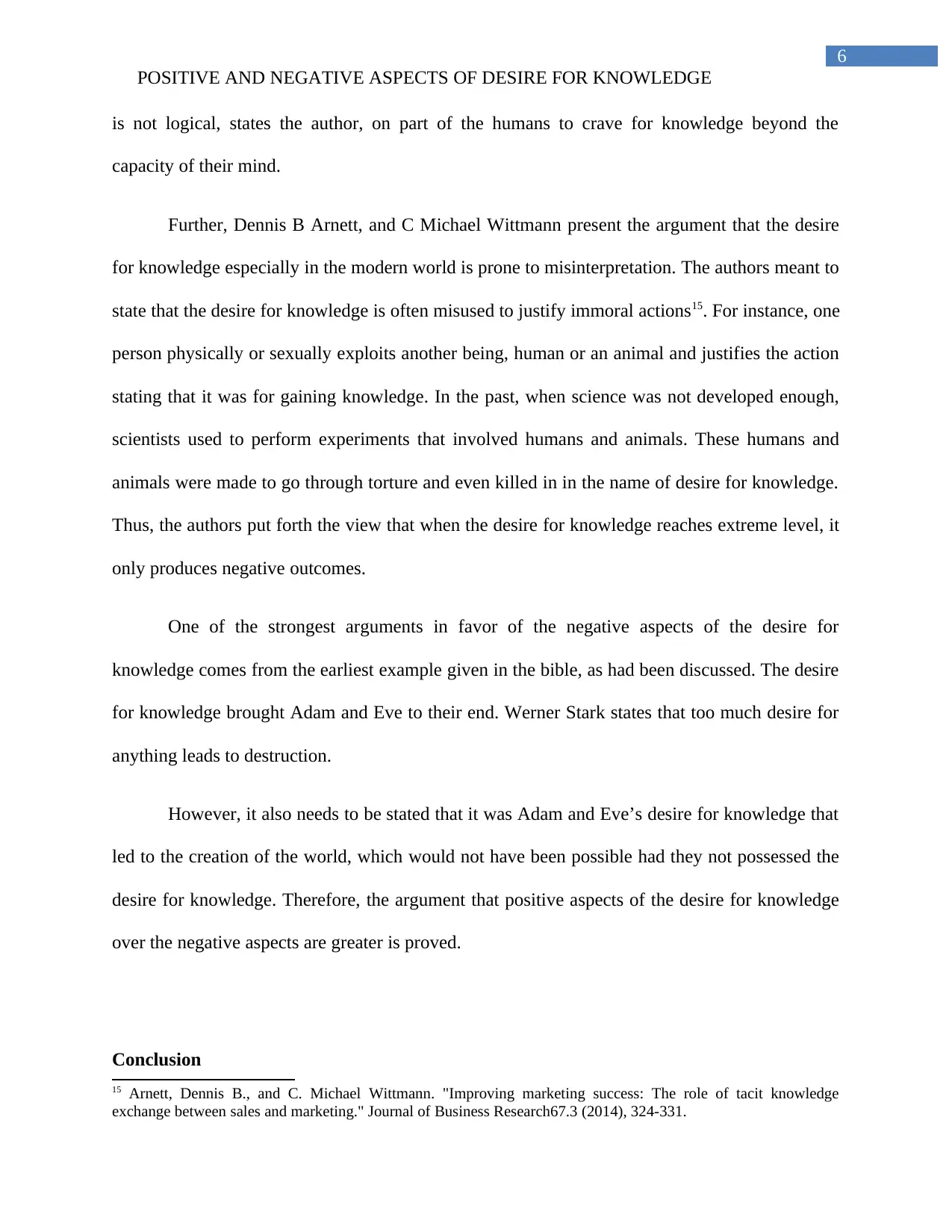
6
POSITIVE AND NEGATIVE ASPECTS OF DESIRE FOR KNOWLEDGE
is not logical, states the author, on part of the humans to crave for knowledge beyond the
capacity of their mind.
Further, Dennis B Arnett, and C Michael Wittmann present the argument that the desire
for knowledge especially in the modern world is prone to misinterpretation. The authors meant to
state that the desire for knowledge is often misused to justify immoral actions15. For instance, one
person physically or sexually exploits another being, human or an animal and justifies the action
stating that it was for gaining knowledge. In the past, when science was not developed enough,
scientists used to perform experiments that involved humans and animals. These humans and
animals were made to go through torture and even killed in in the name of desire for knowledge.
Thus, the authors put forth the view that when the desire for knowledge reaches extreme level, it
only produces negative outcomes.
One of the strongest arguments in favor of the negative aspects of the desire for
knowledge comes from the earliest example given in the bible, as had been discussed. The desire
for knowledge brought Adam and Eve to their end. Werner Stark states that too much desire for
anything leads to destruction.
However, it also needs to be stated that it was Adam and Eve’s desire for knowledge that
led to the creation of the world, which would not have been possible had they not possessed the
desire for knowledge. Therefore, the argument that positive aspects of the desire for knowledge
over the negative aspects are greater is proved.
Conclusion
15 Arnett, Dennis B., and C. Michael Wittmann. "Improving marketing success: The role of tacit knowledge
exchange between sales and marketing." Journal of Business Research67.3 (2014), 324-331.
POSITIVE AND NEGATIVE ASPECTS OF DESIRE FOR KNOWLEDGE
is not logical, states the author, on part of the humans to crave for knowledge beyond the
capacity of their mind.
Further, Dennis B Arnett, and C Michael Wittmann present the argument that the desire
for knowledge especially in the modern world is prone to misinterpretation. The authors meant to
state that the desire for knowledge is often misused to justify immoral actions15. For instance, one
person physically or sexually exploits another being, human or an animal and justifies the action
stating that it was for gaining knowledge. In the past, when science was not developed enough,
scientists used to perform experiments that involved humans and animals. These humans and
animals were made to go through torture and even killed in in the name of desire for knowledge.
Thus, the authors put forth the view that when the desire for knowledge reaches extreme level, it
only produces negative outcomes.
One of the strongest arguments in favor of the negative aspects of the desire for
knowledge comes from the earliest example given in the bible, as had been discussed. The desire
for knowledge brought Adam and Eve to their end. Werner Stark states that too much desire for
anything leads to destruction.
However, it also needs to be stated that it was Adam and Eve’s desire for knowledge that
led to the creation of the world, which would not have been possible had they not possessed the
desire for knowledge. Therefore, the argument that positive aspects of the desire for knowledge
over the negative aspects are greater is proved.
Conclusion
15 Arnett, Dennis B., and C. Michael Wittmann. "Improving marketing success: The role of tacit knowledge
exchange between sales and marketing." Journal of Business Research67.3 (2014), 324-331.
Paraphrase This Document
Need a fresh take? Get an instant paraphrase of this document with our AI Paraphraser
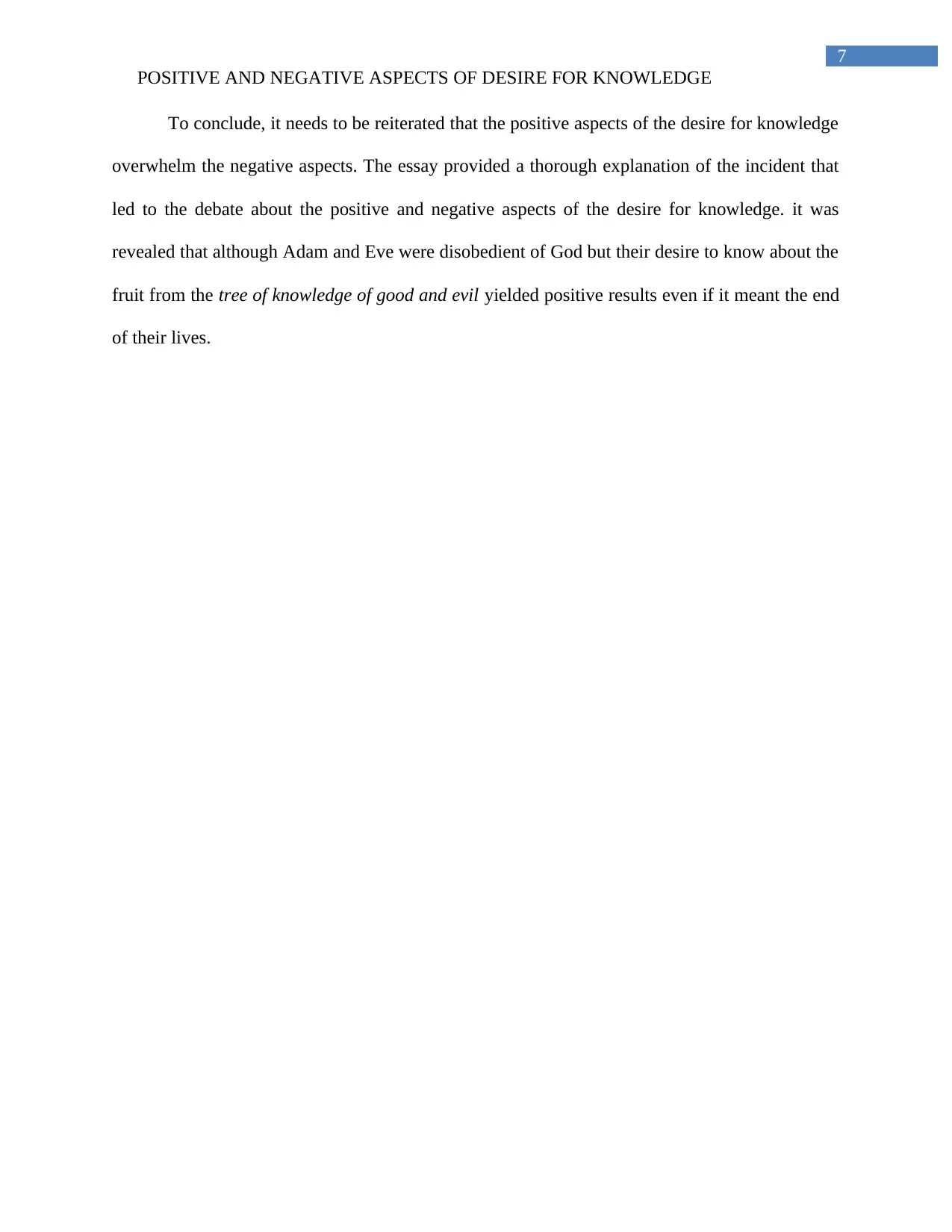
7
POSITIVE AND NEGATIVE ASPECTS OF DESIRE FOR KNOWLEDGE
To conclude, it needs to be reiterated that the positive aspects of the desire for knowledge
overwhelm the negative aspects. The essay provided a thorough explanation of the incident that
led to the debate about the positive and negative aspects of the desire for knowledge. it was
revealed that although Adam and Eve were disobedient of God but their desire to know about the
fruit from the tree of knowledge of good and evil yielded positive results even if it meant the end
of their lives.
POSITIVE AND NEGATIVE ASPECTS OF DESIRE FOR KNOWLEDGE
To conclude, it needs to be reiterated that the positive aspects of the desire for knowledge
overwhelm the negative aspects. The essay provided a thorough explanation of the incident that
led to the debate about the positive and negative aspects of the desire for knowledge. it was
revealed that although Adam and Eve were disobedient of God but their desire to know about the
fruit from the tree of knowledge of good and evil yielded positive results even if it meant the end
of their lives.
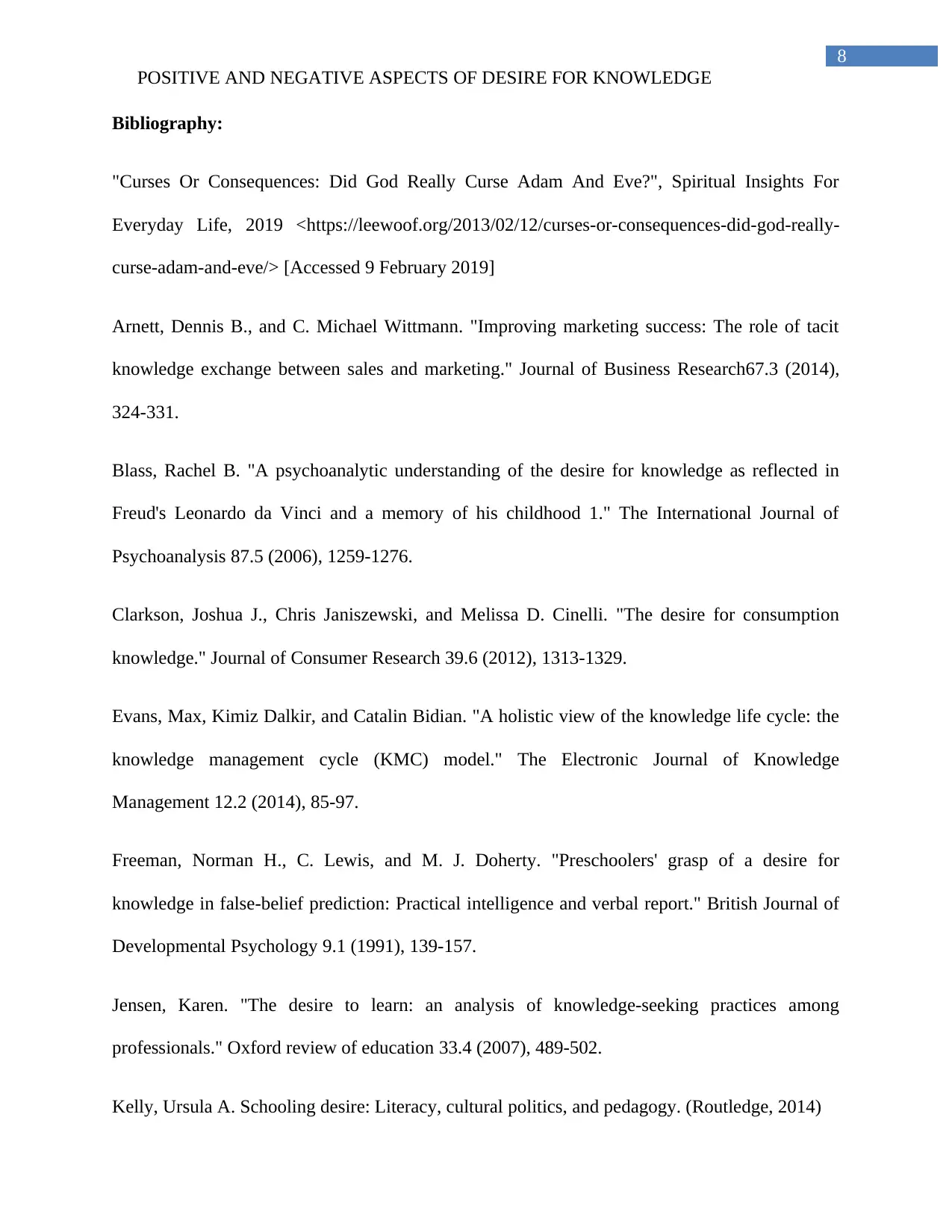
8
POSITIVE AND NEGATIVE ASPECTS OF DESIRE FOR KNOWLEDGE
Bibliography:
"Curses Or Consequences: Did God Really Curse Adam And Eve?", Spiritual Insights For
Everyday Life, 2019 <https://leewoof.org/2013/02/12/curses-or-consequences-did-god-really-
curse-adam-and-eve/> [Accessed 9 February 2019]
Arnett, Dennis B., and C. Michael Wittmann. "Improving marketing success: The role of tacit
knowledge exchange between sales and marketing." Journal of Business Research67.3 (2014),
324-331.
Blass, Rachel B. "A psychoanalytic understanding of the desire for knowledge as reflected in
Freud's Leonardo da Vinci and a memory of his childhood 1." The International Journal of
Psychoanalysis 87.5 (2006), 1259-1276.
Clarkson, Joshua J., Chris Janiszewski, and Melissa D. Cinelli. "The desire for consumption
knowledge." Journal of Consumer Research 39.6 (2012), 1313-1329.
Evans, Max, Kimiz Dalkir, and Catalin Bidian. "A holistic view of the knowledge life cycle: the
knowledge management cycle (KMC) model." The Electronic Journal of Knowledge
Management 12.2 (2014), 85-97.
Freeman, Norman H., C. Lewis, and M. J. Doherty. "Preschoolers' grasp of a desire for
knowledge in false‐belief prediction: Practical intelligence and verbal report." British Journal of
Developmental Psychology 9.1 (1991), 139-157.
Jensen, Karen. "The desire to learn: an analysis of knowledge‐seeking practices among
professionals." Oxford review of education 33.4 (2007), 489-502.
Kelly, Ursula A. Schooling desire: Literacy, cultural politics, and pedagogy. (Routledge, 2014)
POSITIVE AND NEGATIVE ASPECTS OF DESIRE FOR KNOWLEDGE
Bibliography:
"Curses Or Consequences: Did God Really Curse Adam And Eve?", Spiritual Insights For
Everyday Life, 2019 <https://leewoof.org/2013/02/12/curses-or-consequences-did-god-really-
curse-adam-and-eve/> [Accessed 9 February 2019]
Arnett, Dennis B., and C. Michael Wittmann. "Improving marketing success: The role of tacit
knowledge exchange between sales and marketing." Journal of Business Research67.3 (2014),
324-331.
Blass, Rachel B. "A psychoanalytic understanding of the desire for knowledge as reflected in
Freud's Leonardo da Vinci and a memory of his childhood 1." The International Journal of
Psychoanalysis 87.5 (2006), 1259-1276.
Clarkson, Joshua J., Chris Janiszewski, and Melissa D. Cinelli. "The desire for consumption
knowledge." Journal of Consumer Research 39.6 (2012), 1313-1329.
Evans, Max, Kimiz Dalkir, and Catalin Bidian. "A holistic view of the knowledge life cycle: the
knowledge management cycle (KMC) model." The Electronic Journal of Knowledge
Management 12.2 (2014), 85-97.
Freeman, Norman H., C. Lewis, and M. J. Doherty. "Preschoolers' grasp of a desire for
knowledge in false‐belief prediction: Practical intelligence and verbal report." British Journal of
Developmental Psychology 9.1 (1991), 139-157.
Jensen, Karen. "The desire to learn: an analysis of knowledge‐seeking practices among
professionals." Oxford review of education 33.4 (2007), 489-502.
Kelly, Ursula A. Schooling desire: Literacy, cultural politics, and pedagogy. (Routledge, 2014)
⊘ This is a preview!⊘
Do you want full access?
Subscribe today to unlock all pages.

Trusted by 1+ million students worldwide
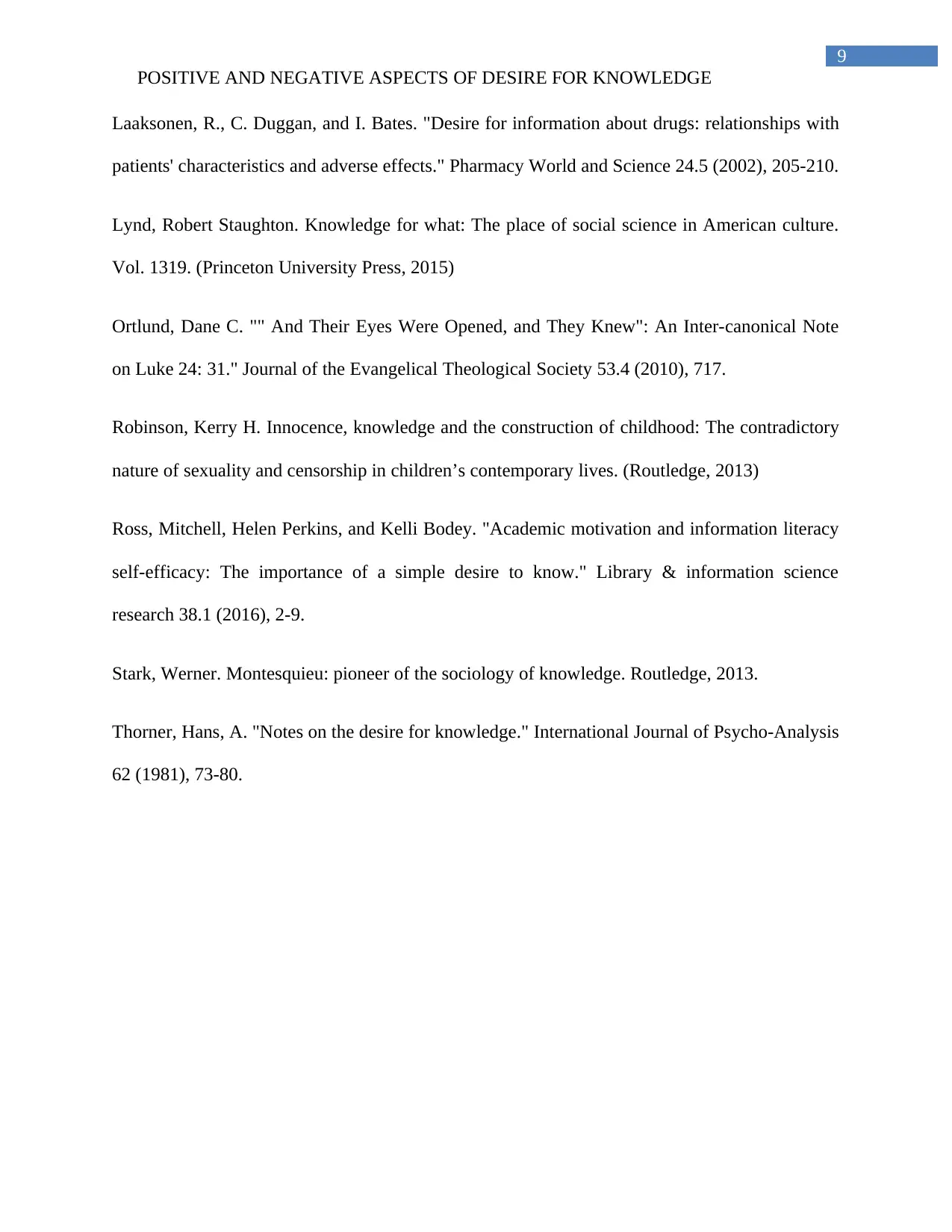
9
POSITIVE AND NEGATIVE ASPECTS OF DESIRE FOR KNOWLEDGE
Laaksonen, R., C. Duggan, and I. Bates. "Desire for information about drugs: relationships with
patients' characteristics and adverse effects." Pharmacy World and Science 24.5 (2002), 205-210.
Lynd, Robert Staughton. Knowledge for what: The place of social science in American culture.
Vol. 1319. (Princeton University Press, 2015)
Ortlund, Dane C. "" And Their Eyes Were Opened, and They Knew": An Inter-canonical Note
on Luke 24: 31." Journal of the Evangelical Theological Society 53.4 (2010), 717.
Robinson, Kerry H. Innocence, knowledge and the construction of childhood: The contradictory
nature of sexuality and censorship in children’s contemporary lives. (Routledge, 2013)
Ross, Mitchell, Helen Perkins, and Kelli Bodey. "Academic motivation and information literacy
self-efficacy: The importance of a simple desire to know." Library & information science
research 38.1 (2016), 2-9.
Stark, Werner. Montesquieu: pioneer of the sociology of knowledge. Routledge, 2013.
Thorner, Hans, A. "Notes on the desire for knowledge." International Journal of Psycho-Analysis
62 (1981), 73-80.
POSITIVE AND NEGATIVE ASPECTS OF DESIRE FOR KNOWLEDGE
Laaksonen, R., C. Duggan, and I. Bates. "Desire for information about drugs: relationships with
patients' characteristics and adverse effects." Pharmacy World and Science 24.5 (2002), 205-210.
Lynd, Robert Staughton. Knowledge for what: The place of social science in American culture.
Vol. 1319. (Princeton University Press, 2015)
Ortlund, Dane C. "" And Their Eyes Were Opened, and They Knew": An Inter-canonical Note
on Luke 24: 31." Journal of the Evangelical Theological Society 53.4 (2010), 717.
Robinson, Kerry H. Innocence, knowledge and the construction of childhood: The contradictory
nature of sexuality and censorship in children’s contemporary lives. (Routledge, 2013)
Ross, Mitchell, Helen Perkins, and Kelli Bodey. "Academic motivation and information literacy
self-efficacy: The importance of a simple desire to know." Library & information science
research 38.1 (2016), 2-9.
Stark, Werner. Montesquieu: pioneer of the sociology of knowledge. Routledge, 2013.
Thorner, Hans, A. "Notes on the desire for knowledge." International Journal of Psycho-Analysis
62 (1981), 73-80.
1 out of 10
Your All-in-One AI-Powered Toolkit for Academic Success.
+13062052269
info@desklib.com
Available 24*7 on WhatsApp / Email
![[object Object]](/_next/static/media/star-bottom.7253800d.svg)
Unlock your academic potential
Copyright © 2020–2026 A2Z Services. All Rights Reserved. Developed and managed by ZUCOL.